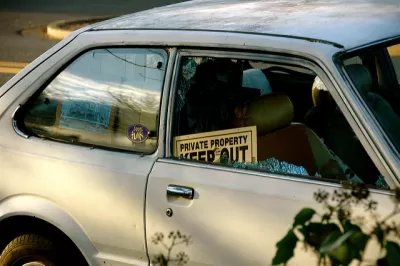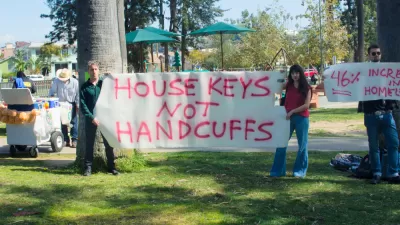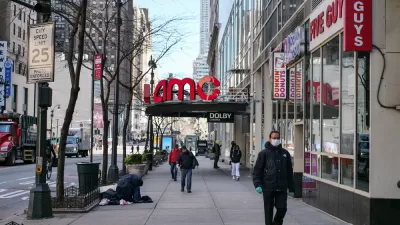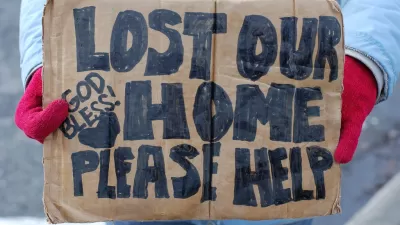Three years ago, Los Angeles passed temporary regulations to limit where people living out of cars could park their cars to sleep. The City Council extended those restrictions in a heated hearing this week.

"Sleeping overnight in cars, vans and RVs will be prohibited again in many parts of Los Angeles, after the City Council voted Tuesday to reinstate rules that limit where people can live in their vehicles," reports Emily Alpert Reyes.
"The decision extends the L.A. regulations, which had expired at the beginning of July, until January. Under the rules [pdf], people cannot spend the night in their cars on residential streets, or live in their vehicles at any time within a block of a park, school, preschool or day care facility."
The City Council hearing to approve the extension of the rule was heated: activists chanted "shame on you" after the vote and at least one person had to be removed from the council chambers in handcuffs. Councilmember Marqueece Harris-Dawson spoke to reporters after saying it was "totally unacceptable" to allow people to live in cars in neighborhoods.
"More than 9,500 people live in cars, vans or RVs throughout the city of Los Angeles, according to the last annual count [pdf]," according to Reyes, and the city only has the operating capacity of safe parking sites around the city currently totals fewer than 200 parking spaces. That number is expected to rise above 300 in the fall.
The article includes more of the politics and history of the decision, which has encountered controversy every time the city has revisited the rules.
FULL STORY: L.A. City Council votes to reimpose limits on living in vehicles

Alabama: Trump Terminates Settlements for Black Communities Harmed By Raw Sewage
Trump deemed the landmark civil rights agreement “illegal DEI and environmental justice policy.”

Planetizen Federal Action Tracker
A weekly monitor of how Trump’s orders and actions are impacting planners and planning in America.

The 120 Year Old Tiny Home Villages That Sheltered San Francisco’s Earthquake Refugees
More than a century ago, San Francisco mobilized to house thousands of residents displaced by the 1906 earthquake. Could their strategy offer a model for the present?

In Both Crashes and Crime, Public Transportation is Far Safer than Driving
Contrary to popular assumptions, public transportation has far lower crash and crime rates than automobile travel. For safer communities, improve and encourage transit travel.

Report: Zoning Reforms Should Complement Nashville’s Ambitious Transit Plan
Without reform, restrictive zoning codes will limit the impact of the city’s planned transit expansion and could exclude some of the residents who depend on transit the most.

Judge Orders Release of Frozen IRA, IIJA Funding
The decision is a victory for environmental groups who charged that freezing funds for critical infrastructure and disaster response programs caused “real and irreparable harm” to communities.
Urban Design for Planners 1: Software Tools
This six-course series explores essential urban design concepts using open source software and equips planners with the tools they need to participate fully in the urban design process.
Planning for Universal Design
Learn the tools for implementing Universal Design in planning regulations.
Clanton & Associates, Inc.
Jessamine County Fiscal Court
Institute for Housing and Urban Development Studies (IHS)
City of Grandview
Harvard GSD Executive Education
Toledo-Lucas County Plan Commissions
Salt Lake City
NYU Wagner Graduate School of Public Service





























